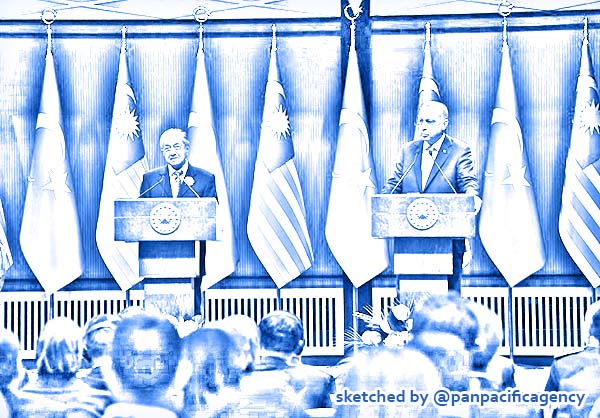[Analytics] How could outreach to Southeast Asia help Turkey?

Tun Dr Mahathir Mohamad and Turkish President Recep Tayyip Erdogan during a joint press conference at the Presidential Complex in Ankara July 25, 2019. — Bernama pic. Sketched by the Pan Pacific Agency.
Faced with economic and strategic challenges, Turkey has turned to Southeast Asia to potentially help revive its economy. Ankara may find support from China in its new push, but building ties with the region will depend on Turkey’s ability to keep religion out of the equation. Niranjan Marjani specially for the ASEAN Today.
On January 6, Turkish Foreign Minister Mevlut Cavusoglu spoke to Southeast Asian ambassadors in Turkey and emphasized the importance of strengthening relations with ASEAN countries as part of the country’s Asia Anew initiative.
Turkey launched its Asia Anew initiative in 2019to diversify ties with Asian countries in the fields of education, defense, trade, technology, culture and political dialogue, but has yet to take any major steps under the program.
Turkey has historically had little interaction with Southeast Asia. Since 2015, Turkey has opened embassies in Brunei, Cambodia, Laos and Myanmar and ASEAN granted Turkey Sectoral Dialogue Partner status in 2017.
ASEAN could be important for Turkey’s economy
Turkey’s outreach to Southeast Asia comes as the country’s economy is going through a crisis, with the Turkish lira losing 20% of its value against the dollar in 2020 alone. Last year, Turkey’s trade gap rose over US$45 billion, an increase of 154% compared to 2019.
Turkey is also involved in a strategic tussle in the eastern Mediterranean over its assertive approach to gas exploration, drawing major objections from Greece and Cyprus. In response to Turkey’s actions in the Mediterranean, the EU has imposed limited sanctions against individuals and companies involved in the exploration activities. However in the wake of fresh tensions between Turkey and Greece, the possibility of a truce between Turkey and the EU is shrinking.
At the same time, the US has imposed sanctions on the Turkish military and top officials over the purchase of a Russian-made S-400 missile defense system.
The EU and the US are among Turkey’s largest economic partners and the EU is a principal source of investments in Turkey.
Turkey’s relations with ASEAN countries are still developing; at present, no Southeast Asian country is among Turkey’s top 15 trading partners, but Turkey does have free trade agreements with Malaysia and Singapore which came into force in 2015 and 2017, respectively. Turkey has been in talks with Thailand about a free trade agreement which, according to Bangkok’s ambassador to Turkey, could boost trade between the two by up to 40%.
Bilateral trade currently sits around US$1.6 billion per year, with the large majority being Thai exports to Turkey. With Indonesia, Turkey reached an agreement in late 2020 to work to increase trade from $1.5 billion per year to $10 billion, and the two are in talks over a free trade deal, the “Turkey-Indonesia Comprehensive Economic Partnership Agreement”.
With uncertainty over Turkey’s relations with the EU and the US, ASEAN could offer a new path to diversifying its economic ties.
China could help Turkey get closer to ASEAN
The China factor could also prove important in Turkey-ASEAN relations. With the Regional Comprehensive Economic Partnership (RCEP) signed in November 2020, China’s influence in ASEAN has only increased and Beijing could use its clout to support Turkey’s relations with the region. Building on Ankara’s agreements with Malaysia and Singapore, China could facilitate more agreements between Turkey and other ASEAN countries.
Supporting Turkey also benefits China since it would help counterbalance India’s efforts to increase its reach in ASEAN, as New Delhi seeks to reset its ties with the region after opting out of the RCEP. Turkey, on its own and as a part of a China-Pakistan-Turkey troika, is already a posing strategic challenge to India in South Asia. Turkey has been explicit about the role it wants to play in Jammu and Kashmir. With South Asia already on Turkey’s agenda, Ankara can find common ground with China in expanding its influence further into Southeast Asia.
The US sanctions on the Turkish military could also provide China an opportunity to strengthen relations with Turkey. Beijing’s ties with Ankara have grown in recent years, with an extradition treaty and Turkey’s move to procure a COVID-19 vaccine from China.
Turkey is also key to China’s Belt and Road Initiative (BRI) and the two are now connected by rail through central Asia via the “Middle Corridor Trans Caspian International Transit Route”. Turkey could benefit from its BRI-driven proximity to China as it seeks a foothold in Southeast Asia.
Will a religious angle play a role between Turkey and ASEAN?
As Turkey looks to gain a foothold in Southeast Asia, the issue of religion cannot be ignored.
There are two aspects to this: one is Turkey’s own record of promoting radicalization. Turkey has been accused of radicalization of Muslims through NGOs and educational programs and supports Islamic countries such as Pakistan and Azerbaijan against non-Islamic countries India and Armenia. Now Turkey is also looking to expand its influence in Bangladesh.
The other aspect is that Turkey’s only meaningful engagement with Southeast Asia in the recent past was on religious grounds. In 2019, Malaysia hosted the Kuala Lumpur Summit to challenge the supremacy of Saudi Arabia in the Muslim world and create an institution parallel to the Arab-dominated Organisation of Islamic Cooperation (OIC). The participants at Kuala Lumpur included Iran, Malaysia, Qatar and Turkey. This summit was a religious gathering and did not include any economic agenda.
It remains to be seen if Turkey is able to keep religion out of its broader engagements with Southeast Asian countries, especially the Muslim-majority countries like Indonesia and Malaysia, and focus only on strengthening economies ties with the region.